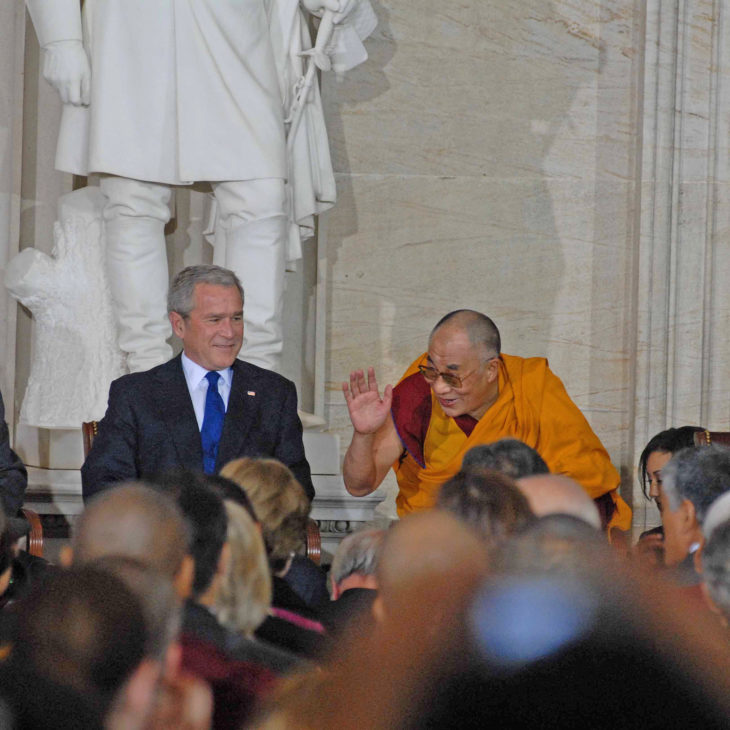Faith is a Bridge: Why Religion Can Help Bring Americans Together
May 6, 2022

In 2006, Madeleine Albright wrote a book called “The Mighty and the Almighty,” which lamented the absence of expertise on religion in the State Department during her tenure as Secretary of State.
In the book, she explores the various ways that a basic understanding of religion was missing from international diplomacy efforts. While the State Department had numerous economic or constitutional experts, only a single person at that time possessed expertise on interfaith relations. What was the result, in Albright’s calculation? The United States was underprepared to navigate the many global issues in which religious diversity was highly implicated – Northern Ireland, the Middle East, the Balkans, parts of Africa. Albright suggests that understanding religious diversity and religious communities could have led to reconciliation and peacebuilding opportunities in ways we hadn’t previously imagined.
Albright’s perspective reflects the work of academic fields that study the integral role that religion plays in conflict and conflict resolution on a global scale. Including scholars such as R. Scott Appleby, Ashutosh Varshnay, Douglas M. Johnston and more, this established field illuminates the possibilities for religiously diverse communities to mitigate conflict and promote cohesion in local, national, and international contexts across the globe.
As polarization becomes an ever more dangerous force in the U.S., we must similarly apply these key learnings to the domestic context as well. While the U.S.-focused efforts to strengthen social cohesion have expanded dramatically over the past decade, religious diversity remains an underleveraged component of a comprehensive and impactful bridgebuilding approach. Just as international leaders like Albright are recognizing that religious identities and diversity play a powerful role in global affairs, so too domestic leaders must understand and engage the power and potential for religious diversity to bridge divides at home. South Africa’s transition from apartheid to democracy actively included religiously diverse leaders, communities, and values – imagine the potential of a similarly engaged network in the context of U.S. polarization.
Interfaith America is a proud member of the growing field of taking on the challenge of strengthening our civic fabric, a group of inspiring philanthropic, civic, academic, and journalistic leaders working both nationally and at the grassroots level. We believe this field is poised to make significant national impact and not a moment too soon – American polarization and animosity are at historic highs.
But we also believe that religious diversity has underutilized potential in the bridgebuilder’s toolkit to bring Americans together. Religious identity is a powerful element in American life, with Americans valuing their religious identities more highly than citizens of other industrialized nations. Religion also plays a distinctive role in American history as a uniquely valued and articulated freedom in the U.S. Constitution.
However, perhaps most importantly, and as conflict resolution scholars know well, religiously diverse communities, traditions, and values bring distinctive assets to bridgebuilding work which leaders can use to great effect. Religious communities are powerful sources of social capital, especially when it comes to concrete action around issues of common concern. Religious and ethical traditions are also vast resources for the shared values and aspirational vision we need to strengthen our democracy. Within religious traditions, we find powerful stories and aspirations to create a more just, kind, and relational world, as well as exemplars of inspiring individuals who strove to live in respectful community with very different people. Religious traditions and practices even offer spiritual practices that can create dispositions for relationship-building and empathy, essential for the work of bridging.
A key part of Interfaith America’s work is to create opportunities to generate the interfaith leadership knowledge and skills necessary to harness these bridgebuilding assets to address America’s deep divides. We work with college students, through the Bridging the Gap program and others, to equip future generations with the skills of interfaith leadership in precisely the moment that our nation needs those abilities most. We advise on policy approaches that can facilitate the involvement and participation of religious and ethical communities in national bridgebuilding initiatives. And we are active partners in the bridging field, working with a cross-section of amazing individuals and organizations that seek to learn about and harness the power of religiously diverse communities and traditions to strengthen their impact in bridging.
We believe in creating a nation where the heroes are the bridgebuilders – and we believe religious diversity is a vital asset in that work.
Mary Ellen Giess is Vice President of Strategic Initiatives and Eboo Patel is President and Founder of Interfaith America.
Share
Related Articles
American Civic Life
American Civic Life
Faith Based Efforts Work in Vaccine Uptake: Now Let’s Make it Easy
American Civic Life



